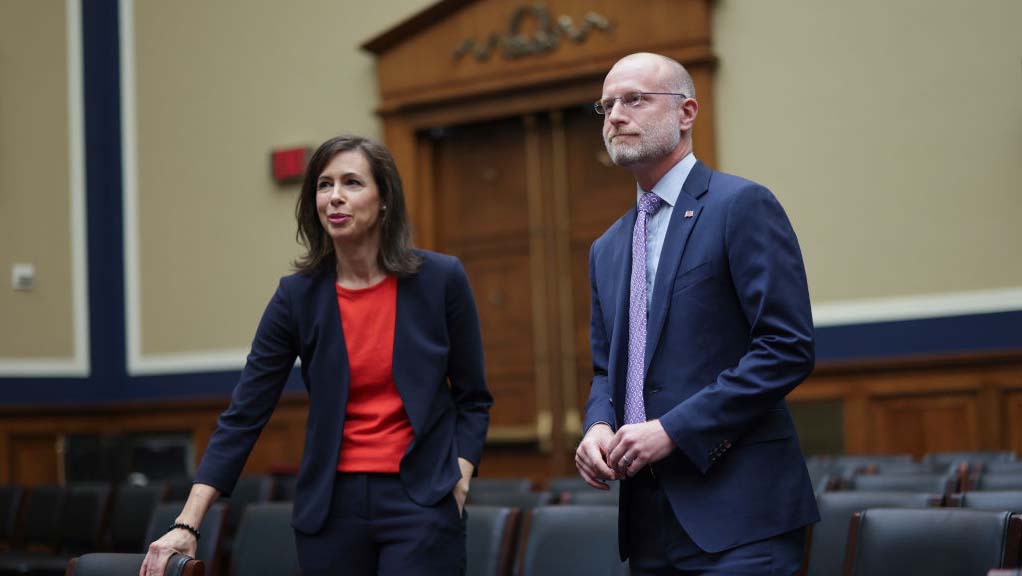
With one day left in her term, outgoing Federal Communications Commission chair Jessica Rosenworcel leveled heavy criticism at the incoming Trump administration over the First Amendment and denied four current complaints filed against broadcasters.
The complaints against WPVI Philadelphia, WCBS-TV New York, WNBC New York and WTXF Philadelphia had all been filed within the past several months and involved a number of complaints, all stemming from what complainants perceived as biased coverage.
Three of the four complaints were filed by the Center for American Rights, which describes itself as a “non-profit public interest law firm.” In the case of ABC-owned WPVI, the Center accused the Philadelphia TV station for what it claimed was “news distortion” during the broadcast of the oresidential debate on Sept. 10, 2024. In WCBS’s case, the center accused CBS of biased editing during an Oct. 7 "60 Minutes" interview with Vice President Kamala Harris, then the Democratic presidential candidate. WNBC was also accused of biased coverage when Harris appeared on an episode of “Saturday Night Live” in October.
The fourth denial went to the Media and Democracy Project (MAD), a liberal organization that petitioned the FCC last year to deny the renewal of Fox-owned WTXF-TV due to Fox News Channel’ $787 million defamation settlement with Dominion Voting Systems last year. (Because networks don’t have broadcast licenses, the complainants use local affiliates as their targets.)
Rosenworcel’s likely successor, Brendan Carr, has also accused CBS of bias, and said the FCC will take that issue into account when it reviews the pending merger of network parent Paramount Global and Skydance.
He also told the AP last fall that Harris’s appearance on “SNL” was “a clear and blatant effort to evade the FCC’s Equal Time rule.”
At a Congressional hearing last September, Carr was noncommital when asked whether he would have pulled WPVI’s license because of perceived bias during the ABC News-sponsored presidential debate.
The professional video industry's #1 source for news, trends and product and tech information. Sign up below.
During the 2024 campaign, Rosenworcel frequently responded to such accusations of media bias, mostly from the right, and she repeated her arguments in the following statement:
“The First Amendment is a cornerstone of our democracy. By restricting the government from making laws that impair freedom of speech, the First Amendment preserves our right to express ourselves. The freedom of the press in this country depends on it.
“Over the course of history, our government leaders have clashed with news organizations that cover their efforts. President John Adams, for instance, championed a law that made it illegal to print, utter or publish malicious statements about the federal government. President Nixon targeted the license renewals of two television stations that were owned by the newspaper investigating his involvement in Watergate.
“More recently this threat to the First Amendment has taken on new forms, as the incoming President has called on the Federal Communications Commission to revoke licenses for broadcast television stations because he disagrees with their content and coverage.
“It may seem quaint to draw attention like this to broadcast licenses, in an era when so many of us seek out information we want, when we want it, from where we want it, on any screen handy. But these stations remain a vital source of local and national news. And there is nothing antiquated about the idea that the FCC has a duty to respect the Constitution.
“Today, I have directed the FCC to take a stand on behalf of the First Amendment. We draw a bright line at a moment when clarity about government interference with the free press is needed more than ever. The action we take makes clear two things. First, the FCC should not be the President’s speech police. Second, the FCC should not be journalism’s censor-in-chief.
“The agency has before it four complaints and petitions that seek to curtail freedom of the press and undermine the First Amendment. They come from all corners—right and left—but what they have in common is they ask the FCC to penalize broadcast television stations because they dislike station behavior, content or coverage. The first asks that the FCC penalize a television station for the substance of the presidential debate on the basis that it was not a true news event. The second seeks to use the FCC to demand the release of the transcript of a news interview as a condition of continued broadcast licensing. The third asks that the FCC fine a television station regarding equal time for programming involving political candidates. The fourth seeks to have the FCC remove the license of a television station for the character shortcomings of its corporate ownership. In two Letters and two Orders, we deny all four filings.
“The facts and legal circumstances in each of these cases are different. But what they share is that they seek to weaponize the licensing authority of the FCC in a way that is fundamentally at odds with the First Amendment. To do so would set a dangerous precedent. That is why we reject it here.”
Tom has covered the broadcast technology market for the past 25 years, including three years handling member communications for the National Association of Broadcasters followed by a year as editor of Video Technology News and DTV Business executive newsletters for Phillips Publishing. In 1999 he launched digitalbroadcasting.com for internet B2B portal Verticalnet. He is also a charter member of the CTA's Academy of Digital TV Pioneers. Since 2001, he has been editor-in-chief of TV Tech (www.tvtech.com), the leading source of news and information on broadcast and related media technology and is a frequent contributor and moderator to the brand’s Tech Leadership events.

